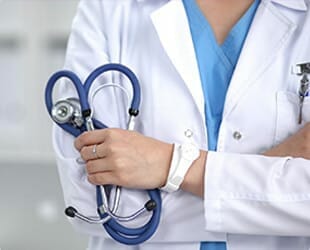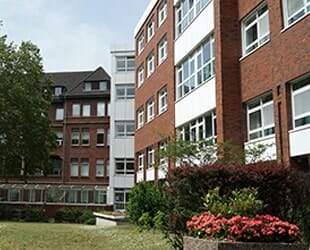Dizziness refers to all disorientation in space. An accurate diagnosis is very important for the treatment in this case, which often requires the joint work of neurologists, otolaryngologists and specialists in internal medicine.
Reasons why you should contact us
It is in the diagnosis of vertigo that the joint work of neurologists, otolaryngologists, radiologists and internal medicine specialists is decisive. With the least amount of time and at a time convenient for you, this is possible and realistic at the EuromedClinic. For training of the vestibular apparatus, the department of physiotherapy, which is available in our center, is at your disposal.
Causes
The most common cause of dizziness is a disorder of the vestibular apparatus located in the inner ear (otolaryngology) or a disorder of the central pathways of the nervous system in the brain/spinal cord (neurology). Less commonly, dizziness can be caused by a heart rhythm disorder or metabolic disease (internal medicine).
Prevention
It is very important to drink enough liquid to ensure normal blood circulation both in the inner ear and in the brain tissues. It is recommended to undergo a neurological prophylactic examination of the condition of the blood supplying cerebral arteries (see neurological follow-up examination).
Symptoms
Dizziness may be prolonged or manifest in the form of seizures. There are several types of dizziness. Most common:
- Vertigo with sensation of rotation
- Pull in a certain direction
- Sensation of staggering without a particularly pronounced direction of vertigo.
Diagnostics
1. The first step in making a diagnosis is an accurate description of the complaints:
- From the point of view of the duration of dizziness: in the form of seizures / prolonged dizziness.
- Type of dizziness: dizziness with a sensation of rotation, traction in a certain direction, a feeling of staggering without a particularly pronounced direction of dizziness
- Additional symptoms: hearing loss, tinnitus, sensation of pressure in the ear, double vision, problems with coordination, impaired perception or decreased strength on one side of the body, impaired speech.
2. Neurological examination of the body / otolaryngological examination:
3. Carrying out duplex sonography of the blood supplying arteries of the brain, including the vertebrobasilar circulation (circulation in the vertebral artery pool).
4. Carrying out an electroencephalogram (EEG) to exclude increased cerebral excitability.
5. Depending on the results, conduct magnetic resonance imaging (MRI) of the head. Laboratory studies, examinations by an internist.
Treatment
Therapy is selected depending on the causative disease that causes dizziness. Therapy may include:
- physical and medical methods of treatment (recommendations for the implementation of special therapeutic movement maneuvers, exercises, training of the vestibular apparatus, physiotherapy)
- medical measures either as infusion therapy or in the form of tablets with a point of application of action on the peripheral vestibular apparatus, vestibular nerve and auditory nerve or centrally in the brain
- in rare cases, surgery is necessary (tumor of the auditory nerve, neurovascular decompression).
Photo gallery
Request appointment
Video
Useful links





